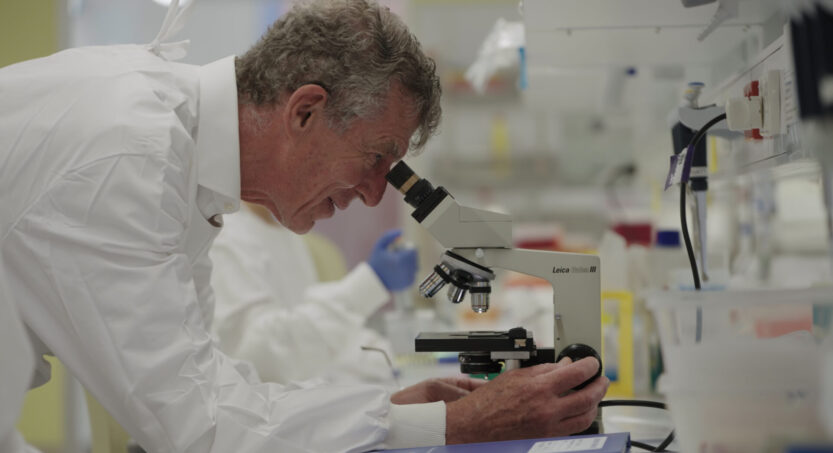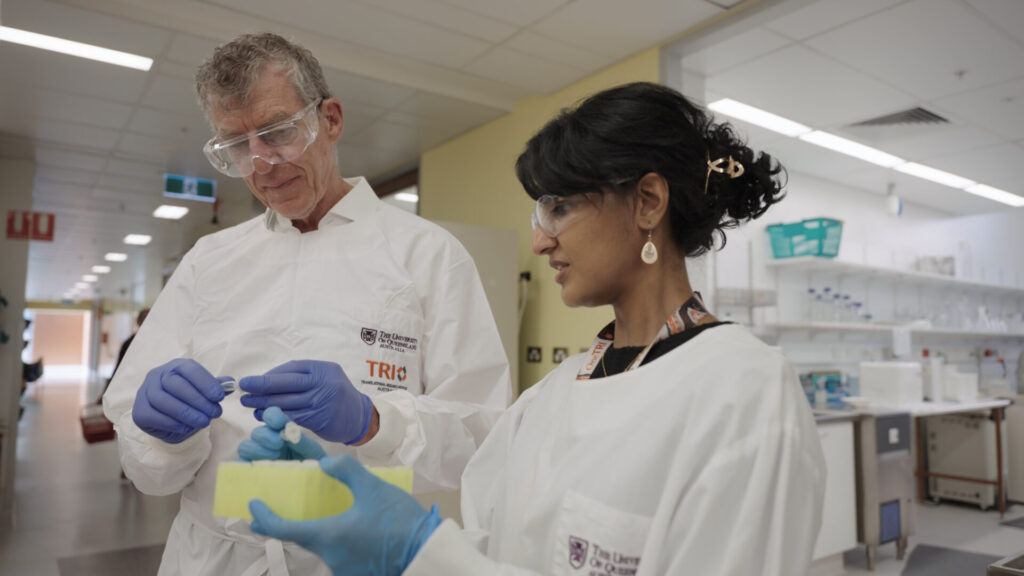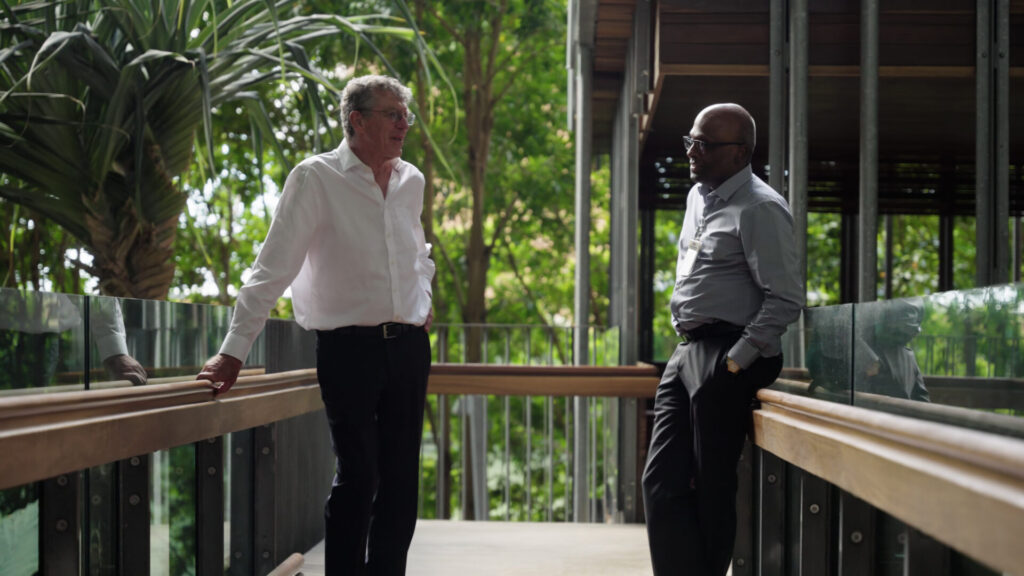Professor Ian Frazer backs double giving, saying philanthropy supports breakthrough research: video

- Prof Frazer, co-inventor of the cervical cancer vaccine, says virtually all his early research was philanthropically funded.
- Government launches new bid to eradicate disease in Australia in a few short years.
- Philanthropy Australia is delighted to launch a video telling the story of how Prof Frazer’s groundbreaking research was built on the ‘philanthropy of promise’.
One of Australia’s leading medical researchers, Professor Ian Frazer AC, who co-invented the cervical cancer vaccine, has joined with Philanthropy Australia to call for the nation to double charitable giving to medical research by 2030 from $1.5 billion to $3 billion. Philanthropy Australia has launched a new video telling the story of how philanthropy underpinned virtually all of Professor Frazer’s early work.
Video: How the cervical cancer vaccine was built on the ‘philanthropy of promise‘
At a conservative estimate, the human papilloma virus (HPV) cervical cancer vaccine has prevented the deaths of at least 100,000 women around the world since it began being rolled out to young girls in 2007. It’s saved hundreds of thousands more women from the trauma of chemotherapy and surgery, and the knock-on effects on their work, family lives and the economy. In short, its impact has been remarkable so far and there are many more lives to be saved in the World Health Organisation’s bid to eradicate the disease and get 90% of girls globally vaccinated by 2030.
Australia is set to become the first country in the world to eliminate cervical cancer after the Federal government announced last week it was launching the National Strategy for the Elimination of Cervical Cancer with a $48.2 million investment over four years. The National Strategy aims to eradicate cervical cancer as a public health issue in Australia by 2035 and the funding aims to improve access to screening and follow up services, as well better data access to target vaccination efforts.
The WHO predicts that a combination of screening, vaccinations and treatment could save 5 million lives by 2050. The vaccine – named Gardasil – was developed by Professor Ian Frazer AC with his late colleague Dr Jian Zhou. Professor Frazer formally retired in 2022 from the post he held at the University of Queensland (UQ) for nearly four decades. But as Emeritus Professor now, he is still a familiar face at UQ’s Translational Research Institute.
The breakthrough for Ian and Jian came when new molecular biology technologies in the early 1990s allowed them to grow the virus in the lab. “When we first saw the virus-like particles, the shell of the virus and the pictures from the electron micrograph, we were pretty excited,” says Ian.
After taking out a patent, it then took a further 15 years for the commercialisation of the vaccine with Merck through CSL plus clinical trials before it was ready to be rolled out. To date it has been dispensed 250 million times and will one day mean the disease – that is still the fourth most prevalent cancer in women – will be virtually non-existent.

Professor Frazer says that ‘without philanthropy, it’s very difficult to start solving a new problem’.
Ian says philanthropy has always supported his research. An early grant from the Lions Club that funded his initial post at UQ and vital equipment for his lab was crucial, he says, along with later funding from the Australian Cancer Research Foundation. Prior to that, the postdoctoral position he had been invited to Australia from Scotland to take up at the Walter and Eliza Institute in Melbourne was also funded by charitable donations. Other grants came from UQ’s donation scheme, the National Health and Medical Research Council, and from a number of charities and organisations such as the Cancer Council Queensland, TRI Foundation and the Hospital Research Foundation Group.
“It would be fair to say that almost all of the work we did in the first 15 years I was here was funded philanthropically,” says Ian. “Competitive funding is built on what you have already achieved. But philanthropic funding generally takes the promise of what you think you might achieve and tries to help you get there.
“That’s a very important distinction because it encourages people to take much more risk.”
“It’s important to recognise that without philanthropy, it’s very difficult to start solving a new problem. It’s not research if you know the outcome,” he says.
Philanthropy is also playing a major role in distributing the vaccine equitably around the world, for which Ian has campaigned. The disease is generally lethal in low-middle income countries because surgery and chemotherapy are not widely available. The Gates Foundation has recognised that the biggest long-term impact will come from vaccinating entire populations and has provided significant funding to help distribute the vaccine in low-middle income countries. Boys are also vaccinated to stop them passing the virus to girls. The companies that make the vaccine have also contributed by providing the vaccine at cost-price for these programs.
Professor Sailesh Kumar, Head of Obstetrics and Gynaecology at UQ, says he remembers when he first heard that a vaccine was being developed. “I was amazed because I knew what an absolute game-changer the vaccine would prove to be,” he says.
Currently, 600,000 women are still diagnosed with cervical cancer around the world and about 360,000 women die every year. While vaccination rates in low-middle income countries are at around 30% compared to 85% in high-income countries, looking ahead to an effective vaccination program eventually being rolled out, the impact will be dramatic. “If we get to the point of having more than 90% coverage around the world, it will likely save more than 300,000 lives every year,” says Sailesh. “The saving to the health system from reducing the number of women affected by cervical cancer in is in the order of tens of millions of dollars.
“Cervical cancer is a devastating diagnosis, particularly in its advanced stages. It robs women of their fertility and of a productive life for a time, or in the worst cases, their lives. Ian’s research has resulted in such a major transformation of so many women’s lives across the world that the impact cannot be overstated,” he says.

Prof Frazer with Prof Sailesh Kumar, Head of Obstetrics and Gynaecology at The University of Queensland, who says the vaccine has been an ‘absolute game-changer’.
Australian Cancer Research Foundation (ACRF) CEO Kerry Strydom says: “ACRF is delighted to have backed Professor Ian Frazer AC’s pioneering research which led to development of the cervical cancer vaccine. True to our model, ACRF provided seed funding of $1 million in 1999 to establish the Centre for Immunology and Cancer Research at Diamantina Institute, University of Queensland. What a phenomenal success story this is.”
“Philanthropic donations are crucial to enable ground-breaking research for other cancers. At ACRF, we know that only brilliant ideas can tackle something as big as cancer. That is why we give scientists the technology, equipment and infrastructure they need for pioneering research. We direct philanthropic donations to research that seeks to progress and transform the way we prevent, detect and treat ALL cancers. In this way we are committed to our vision of one day reaching a world without cancer,” Kerry says.
Ian’s relationship with philanthropy has now come full circle. He is a driving force for university fundraising campaigns and runs his own family foundation. In recent years, Ian and his wife Caroline spearheaded the campaign ‘Not If, When’ for UQ to raise more than $600 million for biomedical research. “Having a big war chest of funding helps research the opportunities, like the cervical cancer vaccine, or unexpected challenges, such as COVID-19,” says Ian.
His own foundation is built on the proceeds of the vaccine patent. “When I started benefiting personally from the royalties, I realised I had a challenge. We didn’t need the money and I wanted to make sure that it was used well. One of the first donations we gave from the Frazer Family Foundation was to the University of Queensland. It was a sort of ‘thank you’ for having looked after me very well,” he says.
The foundation, which he runs with Caroline, targets its funding to students of medicine and the arts, and has distributed millions of dollars in funding. “We focus our funding on helping young people develop their talents, whether it is in research, medicine, or being a ballet dancer or an artist,” says Ian.
“The funding is about providing a benefit for young people to give them an opportunity they wouldn’t otherwise have. We can see that the money can be usefully put to work – and will produce something beneficial not for us, but for the community.”
CEO of Philanthropy Australia Jack Heath says that health and medical research are popular destinations for charitable giving and that “more giving will save more lives”.